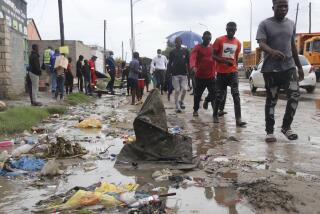2 Cases of Deadly Ebola Now Suspected in Zaire’s Capital : Health: Outbreak ‘still not stable’ in town where it began. Officials seek missing boat captain.
- Share via
KINSHASA, Zaire — Anxious health officials warned Monday that an outbreak of incurable Ebola disease is still raging near the town of Kikwit, and that two suspected cases of the deadly virus have now been found here in the crowded capital.
Abdelhalim Senouci, director of the international federation of Red Cross and Red Crescent societies in Central Africa, said that “the situation is still not stable” in Kikwit.
Although figures on the caseload vary, most of the dozens of confirmed cases of Ebola have been found in Kikwit, where “it is very, very bad,” Senouci said.
He said three Zairian doctors returning to Kinshasa from Kikwit, 370 miles to the east, had been placed under a 28-day medical quarantine as a precautionary measure. “They were working in the field,” he explained.
Dr. Lonyangela Bopenda, Zaire’s secretary general of health, announced that two people who traveled from Kikwit to Kinshasa, a city of at least 4 million people, may now have the disease.
But he insisted there was no immediate cause for alarm. “We have two suspected cases,” he said. “We have no certainty.”
One person, a nurse, was under observation in a Kinshasa hospital. But the other, a riverboat captain, has disappeared since his discharge from a clinic where he was treated for acute diarrhea. Doctors now suspect Ebola was the cause.
“They’re looking for him now,” said Sammy Chumfong, a spokesman for the World Health Organization here.
He said the WHO doctors and scientists are satisfied, for now, that the virus is localized around Kikwit and is unlikely to spread enough to become a full-blown epidemic.
The Red Cross, however, has launched a public education campaign in the capital and is printing 10,000 pamphlets for distribution.
The pamphlets, printed in four local languages, use simple drawings to explain how the Ebola virus is transmitted by blood, sperm and other bodily fluids, and how to recognize its symptoms.
The virus causes severe headaches, fever, vomiting and bloody diarrhea. In 9 out of 10 cases, it attacks the body so relentlessly that death comes within days from massive bleeding from major internal organs. There is no vaccine or cure.
In Geneva, WHO reported that it has confirmation of 17 new Ebola deaths, along with four new cases of Ebola, all in Kikwit where the outbreak began in March, agency spokesman Richard Leclair said.
That brought the total confirmed cases to 84. Of those, 77 have died, including a fourth Italian nun who was caring for Ebola patients at Kikwit General Hospital, the Associated Press said.
WHO said it expects a sharp increase in Ebola cases in the coming weeks. Monday’s report was more pessimistic than earlier ones, in which WHO officials said they were optimistic about controlling the epidemic.
“WHO experts expect a significant increase in cases during the next two to three weeks among people who are incubating the disease, having been exposed to it in the care of relatives or neighbors,” Leclair said.
He said WHO still hopes that improved information about Ebola will eventually contain the spread of the disease. “In two or three weeks we will have higher numbers but from that point it should start going down quite rapidly, but we have no way of guaranteeing it,” he said.
Earlier Monday in Geneva, WHO spokesman Thomson Prentice said that, even if Ebola were confirmed in the Zairian capital, that wouldn’t represent an acceleration of the epidemic. “It would not be a great surprise if one case or more than one case occurred in Kinshasa,” he said, adding: “It doesn’t follow that more people will get infected, because transmission is quite difficult.”
Along the border between Angola and Zaire, though, authorities were taking no chances. Angolan soldiers, the AP reported, were patrolling the jungle near Zaire to prevent refugees who might be carrying Ebola from crossing the border.
Meanwhile, in Zaire, a country known for audacious forms of corruption, government officials and foreign journalists began to have their run-ins.
The Ministry of Information and Press attempted to cash in on the influx of correspondents who have come here to cover the crisis.
Those wanting press accreditation supposedly required to work in the country were given a three-page, printed price list in the minister’s office. The cost for applying: $100. The cost of accreditation: $500. Radio broadcasters were supposed to pay $5,000, television crews $10,000. An official in the minister’s office explained that the accreditation was for “reporters’ safety.” She did not explain. It was not immediately clear if anyone paid the fees.
The government also ordered foreign journalists and TV crews who visited Kikwit to report to a clinic in the capital to start 28 days in quarantine. “I want to point out this is not an arrest,” Bopenda, the secretary general of health, told a news conference. Asked what Zaire would do if the journalists refused, he said the matter would be handed over to police.
More to Read
Sign up for Essential California
The most important California stories and recommendations in your inbox every morning.
You may occasionally receive promotional content from the Los Angeles Times.














